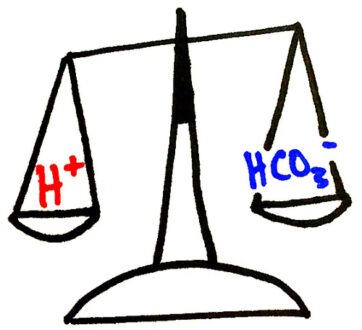Metabolic alkalosis is a primary increase in serum bicarbonate (HCO3-) concentration. Usually such a condition occurs as a consequence of a loss of H+ from the body or a gain in HCO3-. In simple words, Alkalosis may develop when your body has too many bases. It can occur due to decreased blood levels of carbon dioxide, which is an acid. It can also occur due to increased blood levels of bicarbonate, which is a base.
There are four main types of alkalosis. Respiratory alkalosis occurs when there isn’t enough carbon dioxide in your bloodstream. Metabolic alkalosis develops when your body loses too much acid or gains too much base. Hypochloremic alkalosis occurs when there’s a significant decline of chloride in your body. Hypokalemic alkalosis occurs when your body lacks the normal amount of the mineral potassium.
Common symptoms of Alkalosis are irritability, muscle twitching, muscle cramps, or no symptoms at all. If the alkalosis is severe, prolonged contraction and spasms of muscles can also develop. To check its presence, usually a sample of blood taken from an artery which shows that the blood is alkaline. Confusion that can lead towards coma, Hand tremor, Light-headedness, nausea, vomiting, Numbness or tingling in the face, hands, or feet can also a-occur as result of Alkalosis.

Why Does Metabolic Alkalosis Occur?
There could be many reasons as to why this pathological state do occur.Following are some:
- The most logical and largely considered reason is that anything which causes the loss of hydrogen out of the body can cause metabolic alkalosis. Loss of hydrogen through kidney excretion is one possibility.
- Hyperaldosteronism is a condition called causes the excess secretion of hydrogen and potassium out of the body by way of the kidneys. Hydrogen can also be lost from the body through vomiting. When your stomach is full of acid and by vomiting a lot or for a long period of time, usually body deplete stores of acid, and this leads to a rise in the pH of our body (alkalosis). As a result, the pH of our blood become increase (alkalemia). In both cases, the acid loss in excess, therefore amount of bicarbonate which is a basic, has increased in the body and we’re stuck with alkalosis.
- Sometimes our body loses too much potassium. This can occur as a result of the hyperaldosteronism, by the administration of specific diuretics that are also known as water pills. If potassium is lost in excess from the body as well as blood, a condition which is called hypokalemia, then the body must do something. As we know that potassium carry positive charge, so if potassium is lost from the body, it is also lost from within our cells.
- Since the cells lose positively charged potassium ions, they become more negative. Now they struggle to maintain an electrochemical balance. Therefore, cells react by telling the positively charged hydrogen ions to leave the blood and enter inside to restore the appropriate electrical charge. In this way, the hydrogen ions essentially hide away inside of our cells, and causes alkalemia i.e. a high blood pH.
- Another possible reason to occur metabolic alkalosis is when too much bicarbonate is added to our system. This happens when bicarbonate is administered, paradoxically, to treat acidosis. In simple words, when a the hydrogen ions become surrounded by bicarbonate that are injected in the blood, in order to diagnose alkalosis. In addition to this, there may be other reasons to inject bicarbonates like in the people who may have irritability, muscle twitching, or muscle cramps, or even muscle spasms. Metabolic alkalosis is treated by replacing water and electrolytes or correcting the underlying cause. That can also increase bicarbonate in body.
- When the body loses too much acid or gains too much base, Metabolic alkalosis may develop. This may be the case during periods of prolonged vomiting or when stomach acids are suctioned with a stomach tube.
- In rare cases, metabolic alkalosis develops in a person who has ingested too much base from substances such as baking soda.
- Metabolic alkalosis can develop as well when excessive loss of sodium or potassium affects the kidneys’ ability to control the blood’s acid-base balance. For instance, loss of potassium sufficient to cause metabolic alkalosis may result from an overactive adrenal gland or the use of diuretics.
- Another type of Metabolic alkalosis is Respiratory alkalosis which develops when rapid, deep breathing (hyperventilation) causes too much carbon dioxide to be expelled from the bloodstream. causes of hyperventilation and consequent respiratory alkalosis include pain, low levels of oxygen in the blood, fever, and aspirin overdose.
 Health & Care Information
Health & Care Information 

